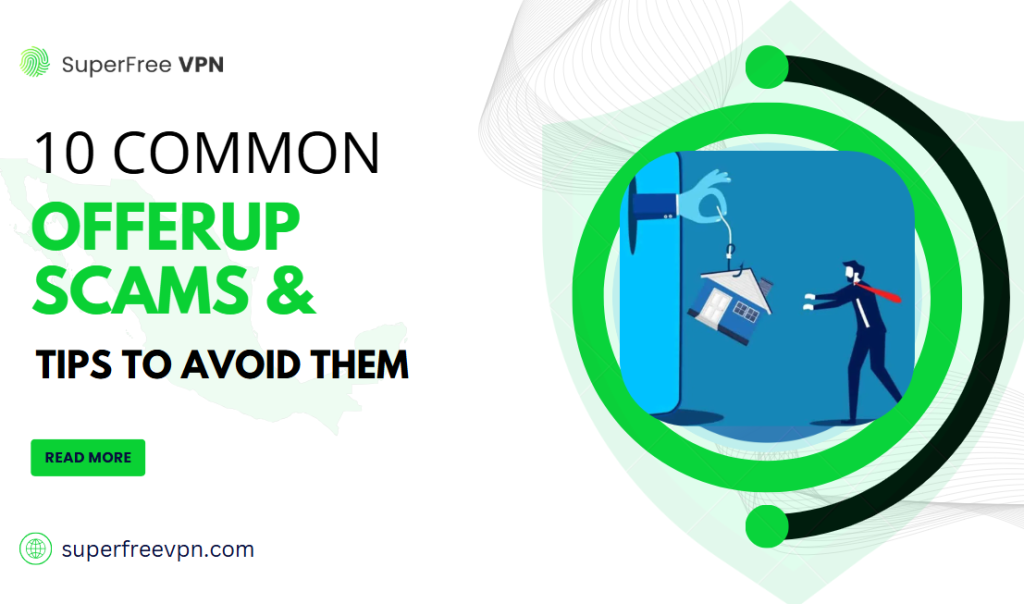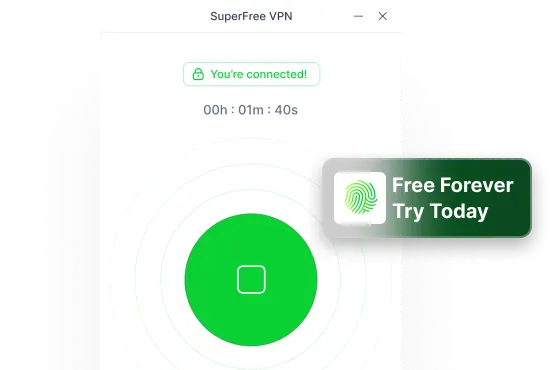OfferUp is a popular online platform that makes it easy to connect with local buyers and sellers.
But with that convenience comes a few dangers, like scams that can cost you and put your personal data at risk.
Keep in mind that scammers are getting smarter every year, and no platform is completely safe – bad guys always try to stay one step ahead of you!
Just to emphasize this point, data breach costs in the industrial sector have gone up by $830,000 a year – alarming, isn’t it?
That’s why it’s more important than ever to protect yourself from online scams.
In this blog, I will explain the most common scams on OfferUp and give you simple tips to avoid them.
By following these steps, you can buy and sell on this marketplace without any fear.
What is OfferUp and Why Scammers Target It?
OfferUp is a popular online platform that lets people buy and sell things locally.
It is like a digital garage sale where you can find great deals nearby.
Because OfferUp allows direct seller-buyer communication, it’s an easy target for scammers.
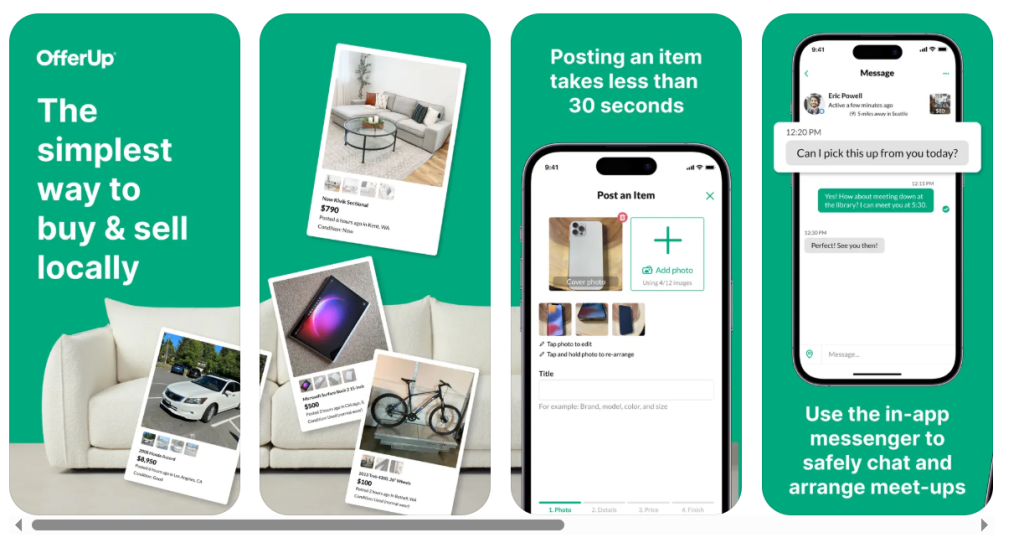
Source: OfferUp
Some create fake listings for popular items at low prices to attract innocent buyers.
Others pretend to be interested in your listing just to trick you into sharing personal info or clicking on malicious links.
For example, you might see a brand-new iPhone listed for half the price – a compelling option you cannot refuse.
The seller asks for payment up front, promising fast shipping. But after you send the money, the iPhone you receive is fake, nowhere near the original one in terms of features or shape.
You have lost your hard-earned money – cost-cutting didn’t benefit you after all!

Source: Geeky Gadgets
To make it harder for scammers to target you with such fake offers and trace your online activity, use a VPN like SuperFree VPN for an extra layer of security.
Most Dangerous OfferUp Scams You Must Know
To make your life easier, I have compiled a list of the most common scams you should be aware of before accessing the OfferUp marketplace.
1. Fake Websites
One of the most common types of online scams involves creating a fake copycat website or mobile application that appears to be just like the original platform.
These pages are designed to trick users into entering their login info, credit card numbers, or other sensitive data.

Source: Electronic Frontier Foundation
Sounds confusing? Stick with me, and I will explain with an example.
Suppose a customer came across what looked like a great car deal on OfferUp.
He clicked the link, which took him to a fake version of the site.
Thinking it was real, he paid $5,200 upfront – the rest of the payment to be delivered later.
The seller vanished, and the car never showed up. He couldn’t get a refund, and his personal info was also exposed, putting him at risk for identity theft.
This is a classic example of how a fake website can trick users into revealing personal information, costing them a lot as well.
How to Prevent This?
Here are some of the tips to help you:
- Only access OfferUp through the official app or OfferUp.com.
- Check the URL for spelling errors to identify fake websites.
- Make sure you are dealing with a seller registered on the official platform
2. Overpayment Requests
Imagine a buyer claims that he “accidentally” sent you more money than the item’s price and asks you to send the extra amount back.
Looks like an honest mistake….. or does it?
Well, this payment is usually fake—a bad check, a fake screenshot of an additional payment sent, or a stolen account.
Once you return the extra cash, the original payment bounces, and you’re stuck with the loss.
For example, a seller listed a laptop for $800. The buyer sent a $1,500 check and asked for $700 to be sent back.
The seller, believing the buyer (and perhaps ignoring his instincts) did it—and later found out the check was fake. They lost both the money and the laptop.
How to Prevent This?
Keep these steps in mind when selling products on OfferUp:
- Never accept payments that exceed the agreed price, even by a dollar. If a buyer sends more money than necessary, consider it a red flag.
- Ensure that any payment, especially checks, has fully cleared and is legitimate before refunding any amount or shipping goods.
- Opt for trusted and secure payment platforms.
3. Alternative Payment Scams
Suppose, as a buyer, you come across attractive bedroom furniture on the OfferUp application.
Naturally, you would want to connect with the seller and finalize the deal as soon as possible.
What if the seller demands you send payment via an unreliable channel rather than the integrated payment system in the application?
Well, this is a red flag – take my advice: don’t proceed with this purchase.
This is a prevalent fraud in which the seller later claims that the payment was not received.
Consequently, you lose the money and don’t receive the bedroom furniture either!
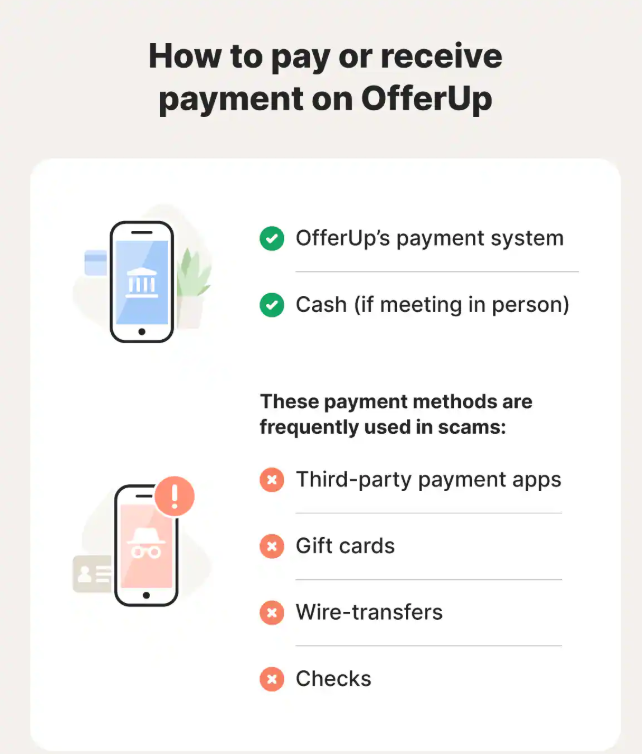
Source: LifeLock by Norton
How to Prevent This?
Follow these practices to avoid this scam:
- Meet in person for high-value items: If possible, arrange a safe, public meetup and pay only after inspecting the item in person.
- Prefer in-app payments: OfferUp has an official payment system for a reason. It provides tracking, proof of transaction, and some protection if things go wrong
- Avoid wire transfers or gift cards: Keep in mind that scammers often ask for payments via Zelle, Cash App, or gift cards because they’re hard to trace and nearly impossible to recover.
4. Unrealistic Price Range
“If something is too good to be true, you can bet it’s not”.
When shopping via online platforms, this is a golden rule that can save you from losing money and confidential information.
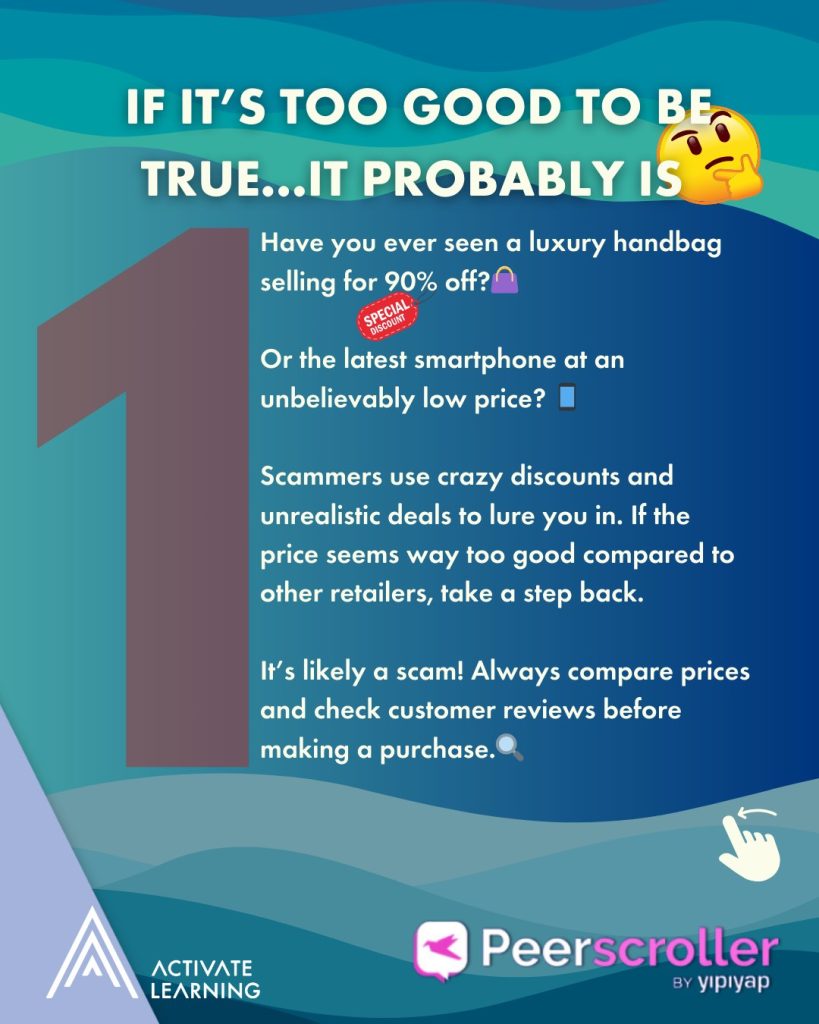
Source: Activate Learning – Facebook Page
If a seller is advertising a high-tech laptop of the latest generation at less than $100, maybe….just maybe…it’s not a fully-functioning laptop after all!
This is a prime example of how scammers target innocent buyers by selling fake items at low prices on this marketplace.
How to Prevent This?
To avoid falling for this trap, follow these steps in mind:
- Research the average market price before contacting the seller.
- Try not to buy expensive items listed at a steep discount without an obvious reason
- Check the seller’s history, ratings, and reviews. A newly created account with no transaction history could be a red flag.
- If a seller rushes you into a deal or demands immediate payment, it’s best to take a step back and reconsider the transaction.
5. Gift Card Scams
What if a random person gets in touch with you with a really generous offer: buy a free gift card to buy multiple expensive items on the OfferUp platform?
If you purchase that card via online payment, what you have actually done is share security-sensitive account information, which can prove very costly.
After all, revealing your credit card information or other personal information to a scammer is the last thing you want.
This is precisely how a gift card scam works: stealing users’ personal information by convincing them to buy fake gift cards.
The following is an example of fake Amazon gift cards promoted by a scammer on Facebook in 2012.
Back then, many believed these gift cards were actually an initiative from Amazon and ended up being scammed (I hope you were not one of them).

Source: Graham Cluley
So, what have we learned from this case study?
- Never accept gift cards from unknown sources.
- Legit sellers or buyers will never ask for payment in gift cards
- If selecting a gift card takes you to an external website link, it is most likely a phishing website – avoid entering your personal information at all costs.
- Carefully check the URL before clicking any gift card offer
6. Bad Check Scam
This is another type of popular online scam that targets sellers.
In this scenario, the buyer requests the seller to deliver the product by giving him a fake check. But now the problem starts for the vulnerable seller.
The check might look real at first, and might even temporarily clear in their bank account.
Feeling confident, the seller hands over the item, thinking the deal is done.
A few days later, the bank flags the check as fake and pulls the funds, leaving the seller without the product and the money.
How to Prevent This?
Always keep these tips in mind when selling via online platforms:
- Use only verified cash or OfferUp’s digital payments
- Wait for any form of non-cash payment to clear fully before delivering
- Avoid accepting personal or business checks from unknown buyers
- If a buyer insists on using a check, suggest meeting at their bank. That way, you can verify the check’s legitimacy on the spot before handing over the item.
7. Damaged Item Swap
This scam mostly targets honest sellers trying to sell used electronics, gadgets, or similar high-value items.
This is how it works: a buyer agrees to purchase your item and seems perfectly normal at first.
The trouble starts when, after receiving the product, they claim it’s broken, defective, or not as described, and demand a refund.
But here’s the catch: they’ve actually swapped your perfectly working item with a damaged or broken version they already owned.
When they return it, you’re left with the faulty one and no way to prove what really happened.
You have no option but to accept their claim and return the money.
Now you’re stuck with a broken item, and both your money and the real product are gone—talk about turning a simple sale into a nightmare!
The following stats underline how common and financially damaging this scam is:
- In 2023, online sellers recorded a loss of more than $100 billion due to return scams.
- Of all the items returned to E-commerce sellers in 2023, 7% were fake.
How To Prevent This:
To avoid such a situation from taking place, these steps are helpful for you:
- Keep a video recording of the item’s condition before delivery
- Note down serial numbers for electronics or high-value items
- If you’re shipping, choose services that offer dispute resolution and protect sellers from fraudulent returns.
- Meet buyers in person for expensive items
- Add a disclaimer: “All sales are final” if selling in person
8. Fake Rental Listings
Easy online communication between sellers and buyers has given rise to this type of scam: one that involves fraudulent dealings between property sellers and buyers.
As a property buyer, when you come across an online listing, always make sure that it is not fake – you cannot afford to lose your hard-earned money on fake property purchases!
This malicious act of sellers posting fake listings on OfferUp to deceive potential buyers is very common nowadays, especially targeting users who are not familiar with property dealings.
If you are not attentive enough during this process, you might end up like the Houston woman who lost $100 believing the following ad was of a legitimate rental listing:

Source: click2houston.com
While the picture itself doesn’t give any indication, what actually happened was the scammer copied this picture from an original listing and simply posted a new listing claiming he was the owner of this property.
While that woman might not get her money back, what you can do is double-check the property listings to identify duplicate listings.
How To Prevent This:
Before finalizing a deal with the property seller, keep these points in mind:
- Never send money without seeing the property in person.
- Visit the location of the advertised apartment yourself, just to be sure.
- Check for any duplicate listings.
- Ask for the seller’s official ID, business credentials, or proof of ownership.
- Avoid deals that feel rushed or “too good to be true” – this is a big red flag.
9. Buyer Pickup Scam
In this scam, a “buyer” agrees to purchase your item but says they can’t pick it up themselves. Instead, they’ll send a friend, courier, or moving service to collect it.
They’ll say they’ve already sent the payment and might even show you a fake confirmation.
It all feels legit—smooth and stress-free—until you check your account and realize the money never showed up.
Once the item is picked up, the seller is left empty-handed, and the buyer disappears.
If it sounds confusing, the following example will provide a clearer picture:
Let’s say you’re selling a TV for $500.
A buyer contacts you, agrees to pay the full amount, and says a moving company will pick it up that same day.
They show you a fake payment receipt to build trust.
Thinking the money is on its way, you hand over the TV. A few days later, you realize the payment was never real—your TV is also gone for good now.
How To Prevent This
With these precautionary measures, you can avoid falling for this scam:
- Don’t release the item unless the payment is fully cleared.
- Refuse any third-party pickups—always deal with the actual buyer.
- Meet in person to finalize the deal.
- Ensure payment is sent through OfferUp’s built-in payment channel.
- In case of online transactions, never rely on screenshots as proof of payment—wait until you see the money in your account, or you will regret it later.
10. Box of Rocks Scam
Let’s say you order what looks like the perfect gaming console deal on OfferUp.
The seller promises fast shipping, sends you a tracking number, and everything seems legit.
You finally receive the box—time to turn on your Xbox.
But hang on!
As soon as you open it, it’s filled with rocks….No, I am not kidding, actual rocks are in the box!
Well, this is exactly how the “Box of Rocks Scam” works – buyers literally receive an empty box full of rocks.
Or if the buyer is really unlucky, he receives boxes of rocks on two consecutive orders, just like this man who was scammed twice after ordering cameras worth $6000 on Amazon.

Source: Fstoppers
Third time lucky perhaps….no harm in trying again!
How to Prevent This:
To avoid receiving such boxes of rocks, here’s what you need to do:
- Only buy from sellers with good reviews and verified profiles.
- Avoid deals that don’t allow in-person pickup for expensive items.
- Stick to OfferUp’s official shipping system to ensure protection.
- Record an unboxing video the moment your package arrives—it’s your best proof if things go wrong.
- Don’t ignore red flags like improper product descriptions or blurry images.
How SuperFree VPN Can Protect Your Data
Are you worried about the protection of your privacy and identity?
SuperFree VPN is the tool you need!
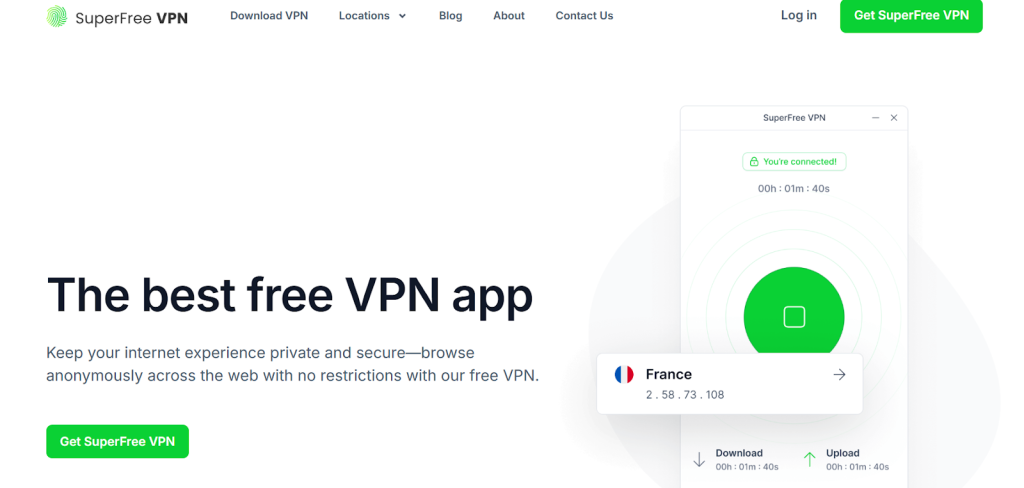
With just one tap, it hides your online address (your IP) and protects your private information (encrypts your data) – whether you’re just browsing or buying things on OfferUp.
But what makes SuperFree VPN stand out from the rest is that it is completely free and doesn’t store the logs of your online activities.
Bottom line?
You get privacy, fast speed, and access to global sites—all of this without paying a dollar.
Download it now, and you’ll never worry again about your information being exposed.
Conclusion
Let’s be real, online shopping has made our lives so much easier, and platforms like OfferUp are really popular for quick buys and sells.
But with all that convenience comes risks, too.
There’ve been countless cases where people lost money, goods, or even personal info while using this marketplace.
So take your time, stay attentive, and follow simple security tips. A little caution goes a long way in keeping your stuff safe.
Better safe than sorry!

